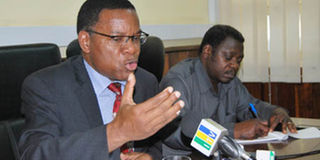New details emerge about Tanzania-Rwanda tension

Foreign Affairs and International Cooperation minister Bernard Membe briefs journalists in Dar es Salaam yesterday on what transpired during the International Conference on Great Lakes Region in Kampala. PHOTO | VEnance nestory
What you need to know:
- Sources close to ICGLR say Kigali fell out with President Jakaya Kikwete because Tanzania’s military was cavorting with FDLR, a group that President Paul Kagame accuses of masterminding the 1994 Rwanda genocide against the Tutsi and moderate Hutus, that led to the death of nearly one million people.
Dar es Salaam/Kampala. New details on why Rwanda was wary of Tanzania in recent times emerged on Thursday during the just ended International Conference on the Great Lakes Region summit held in Uganda.
Sources close to ICGLR say Kigali fell out with President Jakaya Kikwete because Tanzania’s military was cavorting with FDLR, a group that President Paul Kagame accuses of masterminding the 1994 Rwanda genocide against the Tutsi and moderate Hutus, that led to the death of nearly one million people.
According to the sources, a senior FDLR commander, purported to be Gen Stanislas Bigaruka, met top Tanzanian military officers for undisclosed business.
Gen Bigaruka was said to be the second-in-command in the FDLR ranks, and was reportedly kidnapped in Dar es Salaam by operatives suspected to be from Rwanda.
Rwanda’s suspicion heightened when a decision was made to have a UN intervention force commanded by Tanzania deployed to fight the M23 rebels operating in the East of DR-Congo as the FDLR.
The beefing up between the two countries was discussed during the Kampala meeting, even though the main agenda was the renewed fighting between the M23 rebels and the Kinshasa government.
Yesterday, however, the Tanzania People’s Defence Forces (TPDF) denied association with FDLR, with its spokesperson Major Erick Komba saying the army was also not an enemy of Rwanda.
Addressing a press conference at the TPDF headquarters in Dar es Salaam, Major Komba defended Tanzanian troops in DR-Congo, saying Tanzania was there as part of a broader UN mandate.
“Our forces are part of Force Intervention Brigade (FIB) under the UN Stabilisation mission in DR Congo (Monusco),” Major Komba said.
He said the Tanzanian troops were deployed after countries from the Great Lakes Region and Southern Africa Development Community agreed that a neutral Intervention Force be sent to DR-Congo.
Major Komba declined to field questions from journalists who were curious on whether the TPDF’s reaction was as a result of Thursday’s closed door talks between Presidents Kikwete and Kagame.
It was the first time the two leaders were meeting in the same room following the diplomatic row.
Major Komba said Rwanda was a friend in the efforts to bring stability in the DR-Congo. “In fact Rwanda has been helping our forces by ferrying troops and military equipment to DRC,’’ he noted.
In May this year, President Kikwete’s suggestion that Kigali hold talks with the FDLR militia set a series of diplomatic tiff whose consequence it was feared, could worsen the crisis in DR-Congo and compromise regional peace.
On Thursday, Presidents Kikwete, Kagame, Museveni, Joseph Kabila of DR-Congo and Salvar Kiir of South Sudan held a day-long meeting to try to find a lasting solution for M23 woes. The meeting was also attended by the chairperson of the African Union, Ms Nkosazana Dlamini Zuma. The leaders were later joined by respective defence and foreign affairs ministers, intelligence and military chiefs.
The meeting ordered the resumption of talks between Congo’s M23 rebels and the Kinshasa government, which dialogue had stalled after renewed fighting broke out in eastern DR Congo.
Meanwhile at a separate briefing yesterday, Foreign Affairs minister Bernard Membe revealed that President Kikwete and President Kagame will hold further talks in Kigali and Dar es Salaam to further their friendly consultations.
“Thursday’s meeting was ground-breaking and the two discussed existing wrangles, and it will be followed by other consultative meetings to resolve the problems,” said Membe.
In other matters relating to a perceived alienation of Tanzania by other EAC member countries, Mr Membe said the government had officially requested the EAC leadership to explain the consequences of any such discussions.
Tanzania, he said, believed all meetings to strengthen regional ties should first receive blessings from the EAC summit comprising all the heads of state to avoid mistrusts.
Reported by Mbashiru Katare, Athuman Mtulya and Risdel Kasasira




